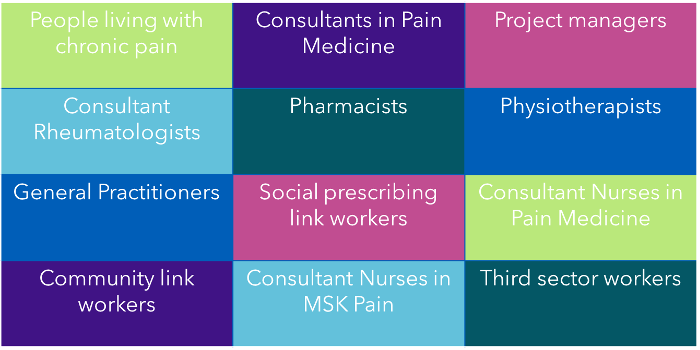Experience-based co-design
August 15, 2022In response to the nationally commissioned Medicines Safety Improvement Programme (MedSIP), the Health Innovation Network has developed a local programme aiming to reduce opioid-related harm to patients experiencing chronic pain (non-cancer related).
This work is one of at least 15 Patient Safety Coalitions collaboratives (PCS) established at ICS level across the country. By March 2024, the aim is to have 30,000 fewer people prescribed oral or transdermal opioids (of any dose) for more than 3 months preventing ~484 deaths.
It is widely known that living with chronic pain can impact all areas of life, and at times can be stressful and challenging. Living with chronic pain can leave people feeling alone, isolated, and not being aware of how to access support that does not come in the form of pain medicines e.g., opioids. To ensure patients were involved in our programme of work, the HIN Involvement and Patient Safety and Experience teams facilitated an experience-based co-design (EBCD) project using the Point of Care Foundation methodology. The project aimed to improve the experience of people living with chronic pain by leveraging existing service improvement in south London.
Our chronic pain experience-based co-design project provided a great space for service users to share their personal experiences across the integrated care pathway. By taking part in the project, I felt that patients were listened to and empowered to speak up to ensure services providing care and support to people living with chronic (persistent) pain were improved based on their needs and preferences.Aurora Todisco, Lived Experience Partner, Health Innovation Network
The stages of our chronic pain experience-based co-design project

The project used all the standard elements of EBCD: filmed interviews with people living with chronic pain, staff interviews and feedback events. The catalyst film summarised patients collective experience providing insights into getting a diagnosis, the role of medicines, the role of alternatives to medicines, relationships with health and care professionals, follow-up with health and care professionals, self-management and adjusting to living with chronic pain.
In this project, the approach moved away from traditional EBCD in two important ways. We did not observe any chronic pain consultations as they vary significantly, and we had a large co-design group that we split into two to explore a range of options during the co-design meetings. The co-design groups focused on deciding and refining co-design group outputs.
Who was involved?
The majority of project participants were from south East London and included the following:

Our implementation considerations
- Treat people living with chronic pain as a whole person. Appreciate that everyone will be at a different stage of living with chronic pain and are still processing and adapting to living with chronic pain.
- Build relationships with staff members delivering services to support chronic pain in your integrated care systems.
- Ensure participants are aware of what the project can deliver in the time allocated from the outset and they have collective ownership of the co-design group outputs.
- Map the chronic pain services in your integrated care systems.
- Identify services that offer alternatives to medicines for chronic pain management in your integrated care systems.
The joint priority chosen by participants was bringing people together. The project outputs intend to raise awareness of how people living with chronic pain can connect to activities, groups and support that improve health and well-being.
You can access the outputs of this project below:
We've recently worked on a resource pack, which accompanies our Opioid Stewardship Action Learning Set 2023–24. This is a collection of resources that supported us in meeting the Medicines Safety Improvement Programme's (MedSIP) aim to minimise opioid prescriptions to reduce harm for people with chronic (non-cancer) pain.
The EBCD poster provides guidance on how social prescribing link workers can support you in dealing with persistent (chronic) pain. While also providing you with a link to find support in your area.
Below is a series of videos filmed during pain awareness month in September 2023. These were interviews of participants of the EBCD project and highlighted key outputs:

